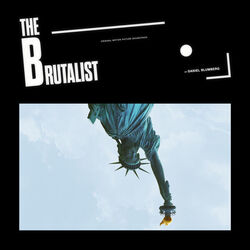 Milan Records today releases The Brutalist (Original Motion Picture Soundtrack) featuring music written by composer Daniel Blumberg for filmmaker Brady Corbet's critically acclaimed new film. Available everywhere now, Blumberg's score, now nominated for Best Original Score at both the Golden Globe and Critics Choice Awards, accompanies Corbet's epic story of a Hungarian architect on his post-war pursuit of the American dream. From large-scale brass orchestrations to intimately lyrical piano melodies via period jazz and 80s synthpop reinterpretations of its key musical themes, the music has continued to amass accolades from press and fans alike, its ambitious scope matching Corbet's monumental cinematic vision. A24 will release The Brutalist in select theaters December 20, including 70mm and IMAX presentations, with a nationwide rollout to follow in January 2025.
Milan Records today releases The Brutalist (Original Motion Picture Soundtrack) featuring music written by composer Daniel Blumberg for filmmaker Brady Corbet's critically acclaimed new film. Available everywhere now, Blumberg's score, now nominated for Best Original Score at both the Golden Globe and Critics Choice Awards, accompanies Corbet's epic story of a Hungarian architect on his post-war pursuit of the American dream. From large-scale brass orchestrations to intimately lyrical piano melodies via period jazz and 80s synthpop reinterpretations of its key musical themes, the music has continued to amass accolades from press and fans alike, its ambitious scope matching Corbet's monumental cinematic vision. A24 will release The Brutalist in select theaters December 20, including 70mm and IMAX presentations, with a nationwide rollout to follow in January 2025.
For his second feature score, composer Daniel Blumberg worked closely with Corbet from the start of the film's seven-year gestation period, resulting in almost two hours of original music (including a fifteen-minute Intermission). The pair identified early on that music would need to play a crucial role in conveying the film's central themes, not least due to the difficulties of depicting the inanimate form of architecture on screen. Envisioning the score as slabs of sound – rich and resonating while also measured and restrained = the music developed into a sonic representation of the design aesthetic.
Using the piano - an instrument with its own cavernous architecture of woodwork, strings and hammers – as a central voice in the film, Blumberg devised a system of piano preparations to explore and modify its acoustic potential. Combined with a versatile palette of brass, wind, double bass and percussive instrumentation, the soundscape shifts from warmly intimate timbres to pulsating orchestral rhythms and extremes in pitch and intonation. The monumental scale of the score is on full display from the film's opening shot, from the metronomic prepared piano motif that emerges from the sonic maelstrom in "Overture (Ship)", to the delicately lyrical solo piano of "Overture (László)" and the iconic rolling brass harmonies of "Overture (Bus)" – firmly establishing the film's narrative while embodying the ideals of Brutalism, at once maximalist and minimalist, where imposing scale and raw textures meet values of simplicity and economy.
To create the score Blumberg worked with a cast of boundary-pushing musicians and improvisers, traveling across the UK and Europe with a custom-built remote recording set-up to capture his players on location. Exploiting the tension between the fluidity of improvised music and the precision of scoring music to picture, he coaxed some beautifully dynamic ensemble and solo performances from his collaborators - German trumpeter Axel Dörner and British saxophonist Evan Parker among them. Some of Parker's most notable contributions soundtrack the film's moments in Carrara, Italy, with Blumberg taking the saxophonist's recordings on-set to capture the reverb response of the marble quarries, resulting in the disorienting, heightened brass melodies heard on "Carrara" and "Marble."
Just as integral, meanwhile, are the solo piano improvisations of avant-garde pianist John Tilbury. Recorded at the pianist's garden studio, Tilbury's contributions serve as the inner voice and musical embodiment of the film's main character, László, creating a living, breathing quality to the deeply personal onscreen story. One of Tilbury's most poignant passages arrives with "Intermission," the fifteen-minute solo piano movement that divides the film's first and second acts. For this piece Blumberg captured the 88-year-old tenderly deconstructing and 'remembering' László's theme, punctuated with moments of faltering silence which allow extra-musical sounds such as the creaking of the piano stool and birdsong to bleed into the mix. The film's second act, meanwhile, begins with "Erzsébet," which opens with an evocative piano melody overlaid with the diegetic sound of the train station and builds into a crescendo of warm brass harmonies to soundtrack one of the film's most touching scenes.
A challenge for Blumberg was how to create a coherent score across a narrative arc spanning the 1940s through to the 1980s. He assembled a quartet (comprising esteemed players Pierre Borel on saxophone, Simon Sieger on piano, Joel Grip on bass and Antonin Gerbal on drums) to perform jazz versions of his themes live on set, resulting in one of the film's most electrifying numbers "Jazz Club," as well as enlisting the foursome for additional improvised bebop pieces like "Building Site" and "Stairs" in favor of licensed source music. Final cue "Epilogue (Venice)", meanwhile, required a radically different sound palette to the rest of the score, when the narrative leaps forward to the inaugural Venice Architecture Biennale of 1980. Traveling to New York to collaborate with synth-pop trailblazer Vince Clarke (known for his genre-defining work with Erasure, Depeche Mode and Yazoo), Blumberg interpolates the film's key themes into a redemptive, synth and drum machine-driven dance track.